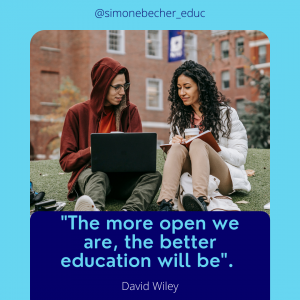It is difficult to imagine the 21st century education without openness and sharing and, at the same time, there is indeed a lot of potential for Open educational resources that still need to be explored and created so that open learning can actually reach the largest number of people.
Open resources break with individuality and make room for the creation of spaces for more dialogical and problematizer teaching and learning processes, converging with Paulo Freire’s (1987) conceptions regarding the ability to collaborative interaction between subjects from different worldviews, needs and knowledge.
According to David Wiley (2010), “Openness is the only means of doing education” and “If there is no sharing there is no education”. Openness implies generosity, a concept so rarely debated in the academy (in my view), but that has an intimate relationship with the essence of what it means to be a teacher. And, if I remember well, personally I chose to be a teacher one day because I really felt good and useful by sharing what I knew (and what I didn’t know too).

I don’t think that today finding openly licensed resources is a big problem, although finding interesting and reliable materials is still a challenge requiring attention and critical thinking. I think two of the biggest challenges for teachers (and HE institutions) are: 1) Technological fluency – According to Kafai et al (1999), to acquire fluency with educational technologies is to develop contemporary skills, intellectual capacities and fundamental concepts and also 2) The lack of reflection on pedagogical practices for the use of open resources as a valid and viable form of learning, to be able to decided appropriately how and when to use these resources, or even to understand the dimension of the potential of openly licensed resources.
Here a list of Creative Commons licensed materials (besides the already known Google, Wikipedia, Youtube) just to mention some that I am more familiar:
If you need images:
If you need Musics:
If you need videos:
If you need audiobooks
REFERENCES
Freire, P.. Pedagogia do oprimido. 17a. ed. Rio de Janeiro: Paz e Terra, 1987.
Kafai, Y.; et al. (1999). Being Fluent with Information Technology.
Wiley, D. (2010). TEDX NYED< https://www.youtube.com/watch?v=Rb0syrgsH6M&ab_channel=TEDxTalks>.



